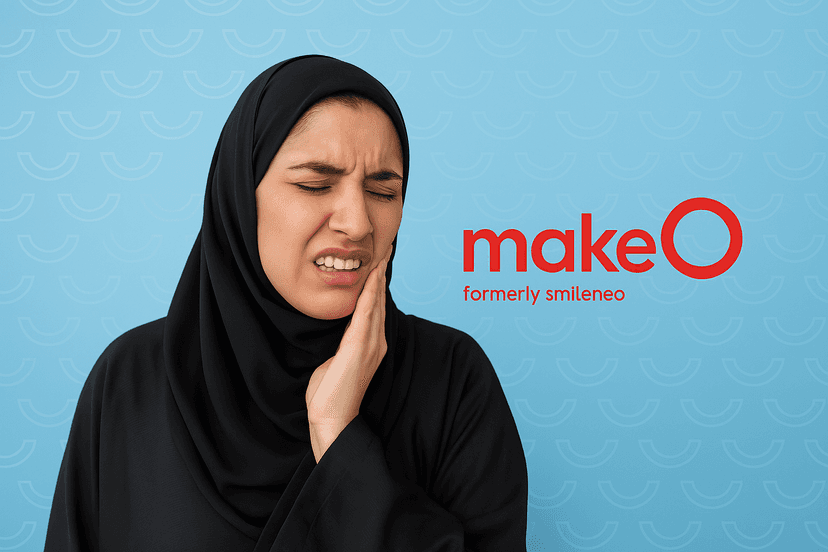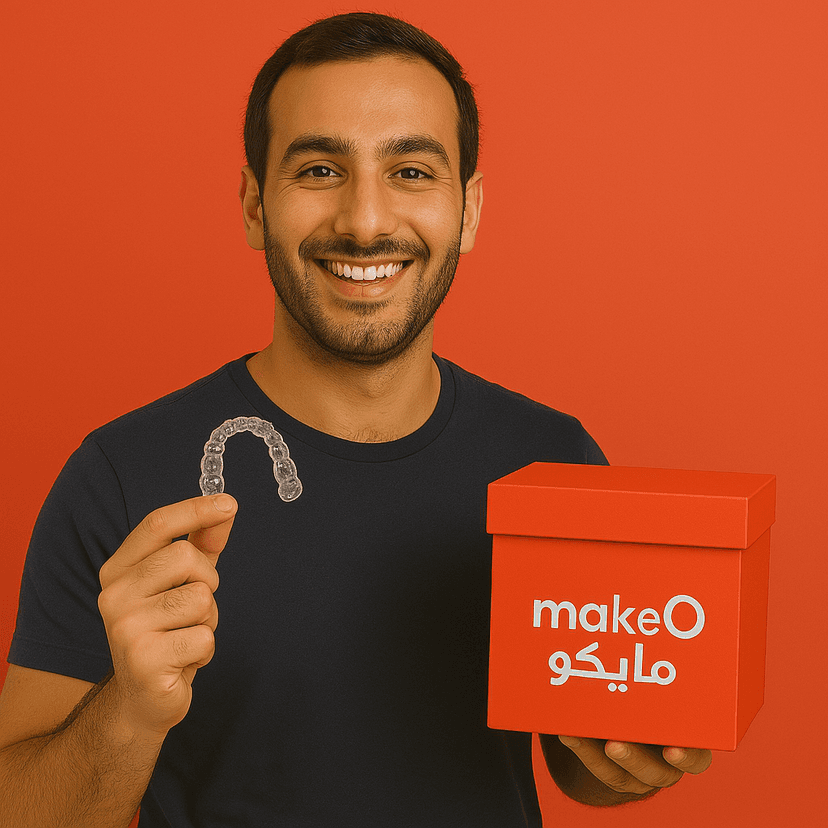MakeO blog
Fasting from dawn to sunset brings many benefits, but it can also affect oral hygiene. Long hours without food and water may lead to bad breath, dry mouth, and an increased risk of plaque buildup. Maintaining good oral hygiene during fasting is essential to keep your mouth fresh and healthy.
If you’re wondering how to take care of your teeth and gums while fasting, this guide will help. Follow these simple yet effective tips to keep your breath fresh and maintain excellent oral hygiene during Ramadan.
1. Brush and Floss Properly After Suhoor and Iftar
Brushing twice a day is super important during Ramadan; once after suhoor (pre-dawn meal) and once after iftar (post-sunset meal). Since you go long hours without food or water, keeping your mouth clean is key to avoiding bad breath and plaque buildup. Make sure to use a soft-bristled toothbrush and fluoride toothpaste, and brush for at least two minutes to get rid of any leftover food and bacteria.
And don’t forget your tongue! A lot of bacteria sit there, which can cause bad breath if not cleaned properly.
2. Stay Hydrated After Iftar
Dehydration is one of the biggest reasons for bad breath during fasting. Since you can’t drink water throughout the day, it’s important to stay hydrated after iftar and before suhoor. Try to drink at least 8-10 glasses of water during non-fasting hours to keep your mouth moist and prevent dryness. Include water-rich fruits and vegetables like cucumbers, watermelon, and oranges in your meals, as they help keep you hydrated.
3. Avoid Foods That Cause Bad Breath
Some foods can make bad breath worse and affect your oral hygiene while fasting. It’s best to limit onions and garlic, as their strong odors can stay in your mouth for hours. Sugary foods and drinks can also be a problem since they encourage bacterial growth, leading to plaque buildup and cavities. Instead, choose fibre-rich foods like fruits, vegetables, and whole grains, which help naturally clean your teeth as you chew.
4. Use a Miswak or a Non-Flavored Toothpaste
A miswak (natural teeth-cleaning stick) is widely used during Ramadan and is permissible while fasting. It helps remove plaque, freshens breath, and promotes gum health.
If you prefer a toothbrush, you can brush without swallowing water or toothpaste, ensuring it does not invalidate your fast. Some scholars advise using non-flavoured toothpaste if you’re concerned about breaking your fast.
5. Rinse Your Mouth Without Swallowing
While fasting, you can rinse your mouth with water to remove any dryness or buildup of bacteria. This helps freshen your breath without breaking your fast. You can rinse your mouth with plain water or a mild saltwater solution. Avoid alcohol-based mouthwashes during fasting hours, as they can cause dryness.
6. Visit the Dentist Before Ramadan
If you experience tooth pain, cavities, or gum issues, visit your dentist before Ramadan begins. Getting a dental check-up and cleaning ensures that you start fasting with a healthy mouth.
If you need dental treatment during Ramadan, procedures that do not require swallowing water or medicine are allowed. However, it’s best to schedule treatments after iftar to avoid any doubts.
Special Oral Hygiene Tips for People Wearing Aligners
If you wear clear aligners, maintaining oral hygiene while fasting requires extra care. Here are some tips to keep your aligners and teeth clean:
1. Wear Aligners for the Recommended 20-22 Hours
Since you eat only during suhoor and iftar, you can keep your aligners on for most of the day, helping you stay on track with treatment.
2. Clean Your Aligners After Suhoor and Iftar
Rinse your aligners with lukewarm water to remove bacteria. Use a soft toothbrush to gently clean them. You should also avoid drinking coloured or sugary drinks while wearing aligners.
3. Brush Before Putting Aligners Back In
After eating, brush your teeth thoroughly before wearing aligners again. This prevents food particles from getting trapped, reducing the risk of bad breath and cavities.
4. Stay Hydrated and Avoid Dry Mouth
Drink plenty of water after iftar to prevent dry mouth while wearing aligners. If your mouth feels dry during fasting, rinse with water (without swallowing) to keep it fresh.
Final Thoughts
Maintaining good oral hygiene while fasting is essential to keep your teeth healthy and your breath fresh.
If you wear aligners, following a proper cleaning routine will ensure your treatment stays on track during Ramadan. Taking small steps every day will not only improve your oral health but also help you feel fresh and confident throughout the month.
Frequently Asked Questions (FAQs)
1. Can I brush my teeth while fasting in Ramadan?
Yes, you can brush your teeth while fasting, but make sure not to swallow water or toothpaste. Some prefer to use a miswak, which is also allowed.
2. Does using mouthwash break the fast?
If the mouthwash is alcohol-free and not swallowed, it does not break the fast. However, some prefer to use plain water or a saltwater rinse to stay cautious.
3. Why does my breath smell bad while fasting?
Bad breath occurs due to dehydration, reduced saliva production, and food particles left in the mouth. Staying hydrated after iftar and brushing properly after suhoor can help.
related categories
Related articles

Can Clear Aligners Correct Buck Teeth? A Comprehensive Guide

How to Maintain Oral Hygiene While Fasting This Ramadan

Common Triggers of Toothache Nerve Pain and How to Avoid Them

What Are Clear Aligners? A Beginner's Guide to Invisible Braces

